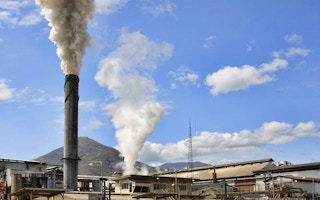In what should, in a rational world, have been an entirely unnecessary research project, US scientists have once again explored familiar ground and arrived at a familiar conclusion: 97 per cent of climate scientists agree that climate change is happening − and that it is caused by humans.
Since the governments of 195 nations have de facto already accepted this, and collectively vowed at the UN climate conference in Paris last December to reduce greenhouse gas emissions from fossil fuel combustion and contain global warming if possible to a rise of 1.5°C, it might be expected that citizens would need no further convincing. But surveys shows that they do, and particularly in the US.
So John Cook, climate communication fellow at the University of Queensland’s Global Change Institute in Australia, and colleagues from the US, Canada and Europe report in Environmental Research Letters that they have examined all the research yet again.
And they have come up yet again with a conclusion that supports all previous research: that 97% of climate scientists agree that climate change is caused by humans.
Consensus on consensus
Cook says he hopes this latest finding, which he terms “consensus on consensus”, will enable scientists to focus on the real work – addressing climate change. “Global warming is the most serious issue of our age, and now scientists, engineers, and business and political leaders can focus their efforts on addressing it,” he says.
Sarah Green, a chemistry professor at Michigan Technological University and one of the report’s co-authors, adds: “What’s important is that this is not just one study − it’s the consensus of multiple studies.”
“
The public has a very skewed idea of how much disagreement there is in the scientific community.
Sarah Green, chemistry professor at Michigan Technological University
Another co-author, Professor Naomi Oreskes, professor of the history of science at Harvard University, says: “Non-expert opinion and making unsupported assumptions can hugely impact the findings. However, with multiple studies finding consistent high levels of scientific agreement, we are confident the debate can now be put to bed.”
The researchers base their conclusion on seven independent consensus studies already conducted by the co-authors. And it includes one in 2013, in which scientists surveyed more than 11,944 abstracts of scientific papers, and concluded – not for the first time − that most scientists agree that humans are changing the climate in which they so successfully evolved.
There has always been healthy and necessary scepticism about any research conclusion, and scientists themselves expect their conclusions to be replicated or proved in error, and their favourite hypotheses to be challenged, repeatedly.
But there has also been an apparently organised programme, for more than a decade, of outright denial and counter-claim.
Additionally, climate scientists have been the subject of condemnation and abuse not normally heaped upon academic researchers.
None of these factors has much altered the overall conclusion, in a programme of sustained international research launched in 1988: climate is changing, and human economic activity is making it happen.
Levels of expertise
In the latest study, the researchers once again concluded that the greater the levels of expertise in climate science among those quizzed, the greater the likelihood of agreement that humans cause climate change.
Sources of possible confusion might include surveys of people who had already made up their minds that it isn’t happening or that it isn’t the fault of humans. It was possible, too, that those quizzed were not themselves experts in climate science: some might be economic geologists, with expertise in coal or oil deposits.
But the outcome, after more than a quarter of a century of scientific consensus on climate change, remains the same: only 12 per cent of people in the US and 15 per cent in Australia are aware that there is strong agreement among climate scientists.
“The public has a very skewed idea of how much disagreement there is in the scientific community,” Professor Green says.










